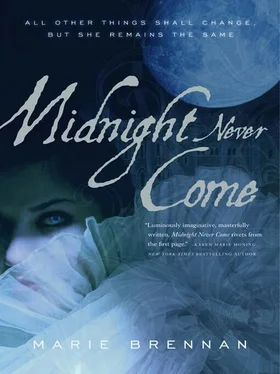As Deven himself was.
With his hand upon the city’s heart, Deven reached out blindly, calling on forces laid there by another pair before them. He had drunk of faerie wine. Lune had borne an angel’s power. They had each been changed; they were each a little of both worlds, and the Onyx Hall answered to them.
The Thames. The wall. The Tower. The cathedral.
As the first stroke of the great bell rang out across the city, he felt the sound wash over and through him. Like a seawall protecting a harbor in a storm, he took the brunt of that force, and bid the entrance close.
A fourth stroke; an eighth; a twelfth. The last echoes of the bell of St. Paul’s faded, and trailing out after it, the other bells of London. Deven waited until the city was utterly silent before he lifted his hand from the Stone.
He looked up slowly, carefully, half-terrified that he was wrong, that he had saved the Hall but left Lune vulnerable, and now she would shatter into nothingness.
Lune’s silver eyes smiled into his, and she used their clasped hands to draw him toward her, so she might lay a kiss on his lips. “I will make you the first of my knights — if you will have me as your lady.”
MEMORY: January 9, 1547
The man walked down a long, colonnaded gallery, listening to his boot heels click on the stone, trailing his fingers in wonder across the pillars as he passed them by. It was impossible that this should all be here, that it should have come into being in the course of mere minutes, and yet he had seen it with his own eyes. Indeed, it was partly his doing.
The thought still dizzied him.
The place was enormous, far larger than he had expected, and so far almost entirely deserted. The sisters had chosen to stay in their own home, though they visited from time to time. Others would come, they assured him, once word spread farther, once folk believed.
Until then, it was just him, and the woman he sought.
He found her in the garden. They called it so, even though it was barely begun: a few brave clusters of flowers — a gift from the sisters — grouped around a bench that sat on the bank of the Walbrook. She was not seated on the bench, but on the ground, trailing her fingers in the water, a distant expression on her face. The air in the garden was pleasantly cool, a gentle contrast to the winter-locked world outside.
She did not move as he seated himself on the ground next to her. “I have brought seeds,” he said. “I have no gift for planting, but I am sure we can convince Gertrude — since they are not roses.” She did not respond, and his expression softened. He reached for her nearer hand and took it in his own. “Suspiria, look at me.”
Her eyes glimmered with the tears she was too proud to shed. “It has accomplished nothing,” she said, her low, melodic voice trembling.
“Did you hear that sound, half an hour ago?”
“What sound?”
He smiled at her. “Precisely. All the church bells of the city rang, and you did not hear a thing. This is a haven the likes of which has never existed, not even in legend. In time many fae will come, all of them dwelling in perfect safety beneath a mortal city, and you say it has accomplished nothing?”
She pulled her hand from his and looked away again. “It has not lifted the curse.”
Of course. Francis had known Suspiria far longer than his appearance would suggest; he had not dwelt among mortals for many a year now. This hall had been an undertaking in its own right, a challenge that fascinated them both, and they had many grand dreams of what could be done with it, now that it was built. But it was born for another purpose, one never far from Suspiria’s mind.
In that respect, it had failed.
He shifted closer and put gentle pressure on her shoulder, until she yielded and lay down, her head in his lap. With careful fingers he brushed her hair back, wondering if he should tell her what he knew: that the face he saw was an illusion, crafted to hide the age and degeneration beneath. The truth did not repel him — but he feared it would repel her, to know that he knew.
So he kept silent as always, and closed his eyes, losing himself in the silky touch of her hair, the quiet rippling of the Walbrook.
The gentle sound lifted him free of the confines of his mind, floating him into that space where time’s grip slackened and fell away. And in that space, an image formed.
Suspiria felt his body change. She sat up, escaping his suddenly stilled arms, and took his face in her delicate hands. “A vision?”
He nodded, not yet capable of speech.
The wistful, loving smile he knew so well softened her face. He had not seen it often of late. “My Tiresias,” she said, stroking his cheekbone with one finger. “What did you see?”
“A heart,” he whispered.
“Whose heart?”
Francis shook his head. Too often it was thus, that he saw without understanding. “The heart was exchanged for an apple of incorruptible gold. I do not know what it means.”
“Nor I,” Suspiria admitted. “But this is not the first time such meaning has eluded us — nor, I think, will it be the last.”
He managed a smile again. “A poor seer I am. Perhaps I have been too long among your kind, and can no longer tell the difference between true visions and my own fancy.”
She laughed, which he counted a victory. “Such games we could play with that; most fae would believe even the strangest things to be honest prophecy. We could go to Herne’s court and spread great confusion there.”
If it would lighten her heart, he would have gladly done it, and risked the great stag-horned king’s wrath. But sound distracted him, something more than the gentle noise of the brook. Someone was coming, along the passage that led to the garden.
Suspiria heard it, too, and they rose in time to see the plump figure of Rosamund Goodemeade appear in an archway. Nor was she alone: behind her stood a fae he did not recognize, travel-stained and weary, with a great pack upon his back.
Francis took Suspiria’s hand, and she raised her eyebrows at him. “It seems another has come to join us. Come, let us welcome him together.”
WINDSOR GREAT PARK, BERKSHIRE: June 11, 1590
The oak tree might have stood there from the beginning of time, so ancient and huge had it grown, and its spreading branches extended like mighty sheltering arms, casting emerald shadows on the ground below.
Beneath this canopy stood more than two score people, the greatest gathering of faerie royalty England had ever seen. From Cumberland and Northumberland to Cornwall and Kent they came, and all the lands in between: kings and queens, lords and ladies, a breathtaking array of great and noble persons, with their attendants watching from a distance.
They met here because it was neutral ground, safely removed from the territory in dispute and the faerie palace many still thought of as an unnatural creation, an emblem of the Queen they despised. Under the watchful aegis of the oak, the ancient tree of kings, they gathered to discuss the matter — and, ultimately, to recognize the sovereignty of a new Queen.
It was a formality, Lune knew. They acknowledged her right to London the moment they obeyed her command to leave. Her fingers stroked the hilt of the sword as one of the kings rolled out a sonorous, intricate speech about the traditional rights of a faerie monarch. She did not want to inherit Invidiana’s throne. It carried with it too many dark memories; the stones of the Onyx Hall would never be free of blood.
But that choice, like others, could not be unmade.
The orations had gone on for quite some time. Lune suspected her fellow monarchs were luxuriating in the restoration of their dignity and authority. But in time she grew impatient; she was glad when her own opportunity came.
Читать дальше












